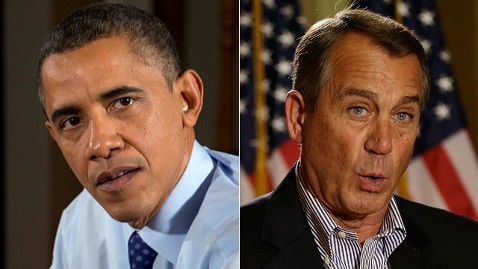STORY HIGHLIGHTS
- NEW: White House threatens to veto Boehner's "plan B"
- President Obama suggests Republicans are fixated on besting him personally
- Speaker Boehner says the House will pass his fallback tax plan Thursday
- Without a deal, everyone's taxes go up in the new year
Washington (CNN) -- After progress earlier this week in fiscal cliff negotiations, President Barack Obama and House Speaker John Boehner butted heads Wednesday, setting the stage for a showdown as the deadline looms for an agreement.
The negotiations had focused on a $2 trillion package of new revenue, spending cuts and entitlement changes the two sides have shaped into a broad deficit reduction plan.
Boehner on Tuesday proposed a "plan B," which would extend Bush-era tax cuts on income of up to $1 million. He described it as a fallback option to prevent a sweeping tax hike while negotiations continue on a broader plan.
But the White House on Wednesday threatened to veto the House Republican "plan B," saying it would bring only "minimal" changes in projected budget deficits.
Obama told reporters earlier in the day that Republicans were focused too much on besting him personally rather than thinking about what's best for the country.
"Take the deal," Obama said to Republicans, referring to the broader proposal, saying it would "reduce the deficit more than any other deficit reduction package" and would amount to a significant achievement.
"They should be proud of it," Obama said. "But they keep on finding ways to say 'no' as opposed to finding ways to say 'yes.' "
The comments at a White House news conference came less than two weeks before the end of the year, when the nation would face automatic tax increases on everyone and deep spending cuts at the end of the year if no agreement is reached.
Economists say that failure to reach agreement could spark another recession.
Boehner issued his own statement Wednesday, saying the president had yet to make a proposal offering a balance between increased revenue and spending cuts.
In a 52-second appearance before reporters, Boehner said the House will pass his fallback plan Thursday limiting tax increases to income above $1 million.
While the plan represents a concession from his original opposition to any increase in tax rates, the Boehner plan sets a higher threshold for a rate hike than the $400,000 sought by Obama.
Once the House passes his plan, the president can either persuade Senate Democrats to accept it or "be responsible for the largest tax increase in American history," Boehner said before walking off without answering shouted questions.
The Obama administration and congressional Democrats said Boehner changed course because he was unable to muster Republican support for the larger deal being negotiated with Obama.
At his news conference, Obama alluded to last Friday's Connecticut school shootings in calling on Republicans to put aside political brinksmanship. "If there's one thing we should have after this week, it should be perspective about what's important," he said.
"Right now, what the country needs is for us to compromise," he continued. He characterized as "puzzling" the GOP refusal to accept his compromise.
Asked why an agreement was proving so elusive after both sides had made concessions, Obama said it might be that "it is very hard for them to say 'yes' to me."
"At some point they've got to take me out of it," Obama said of Republicans, adding they should instead focus on "doing something good for the country."
Boehner responded by arguing that Obama's latest proposal was not evenly balanced, with more new revenue opposed by Republicans instead of the spending cuts and entitlement reforms they seek.
With automatic tax hikes looming for all, Boehner said, his plan B proposal would "make permanent tax relief for nearly every American."
While addressing part of the fiscal cliff, the Boehner plan B would leave intact government spending cuts, including those related to defense, which are required under a budget deal reached last year to raise the federal debt ceiling. Known as sequestration, the cuts were intended to motivate Congress to reach a deficit reduction deal.
Opinion: Art that calls the fiscal cliff's bluff
Obama said Wednesday the Boehner proposal "defies logic" because it raises tax rates on some Americans, which Republicans have said they didn't want, and contains no spending cuts, which Republicans say they do want.
He also criticized the Boehner measure as a benefit for wealthy Americans, who would have lower tax rates extended on their income up to $1 million.
The White House and congressional Democrats say the Boehner plan B has no chance of passing Congress, and Obama added that bringing it up now serves only to waste time.
Senior administration officials said no further talks have occurred between Obama and Boehner since Monday. According to the officials, Obama will delay his planned holiday trip to Hawaii on Friday if no deal is reached by then.
Republican Rep. Steve Womack of Arkansas called Boehner's move a negotiating tactic, and GOP leaders sought to corral support for the plan B option.
They planned to vote Thursday on Boehner's proposal, as well as Obama's long-standing proposal to return to higher tax rates of the 1990s on income above $250,000 for families.
Obama on Monday raised the threshold for the higher tax rates to $400,000.
Conservative allies publicly supported Boehner's plan Wednesday.
Anti-tax crusader Grover Norquist provided political cover for Republicans who signed his pledge against tax increases, saying they could support the Boehner plan B because it adhered to the meaning of their promise to oppose tax hikes.
House Budget Chairman Paul Ryan, who was the Republican vice presidential nominee in the November election, will vote for Boehner's plan, a spokesman said Wednesday.
Conservatives trying to shrink the federal government generally oppose increasing tax revenue. They are particularly opposed to higher tax rates.
Obama and Democrats argue that increased revenue, including higher tax rates on the wealthy, must be part of broader deficit reduction to prevent the middle class from getting hit too hard.
Obama made the tax proposal a theme of his re-election campaign, arguing that it would prevent a tax increase for middle-class Americans in a time of needed fiscal austerity.
Polls consistently show strong public support for the Obama plan, and some Republicans have called for giving the president what he wants on the tax issue in order to focus negotiations on cuts to spending and entitlement programs.
Budget experts: Fiscal cliff deal could disappoint
Boehner and Republicans initially opposed any rise in tax rates but conceded to raising more revenue by eliminating some deductions and loopholes. The offer of a plan with higher rates for millionaires represented a further concession, but Obama and Democrats say it is not enough to ensure sufficient revenue from wealthy Americans as part of a deficit reduction package.
Senate Majority Leader Harry Reid of Nevada said Boehner's plan appears to be a result of pressure from tea party conservatives opposing a wider deal.
"It would be a shame if Republicans abandoned productive negotiations due to pressure from the tea party, as they have time and again," Reid said this week.
Boehner's spokesman, Michael Steel, shot back that the plan B proposal gave Democrats what they wanted -- higher tax rates on millionaires. He noted that the Senate passed a similar measure in 2010, and asserted that to oppose Boehner's plan now would make Democrats responsible for failing to avoid the fiscal cliff.
That brought a response from a spokesman for Democratic Sen. Charles Schumer of New York, who came up with the 2010 compromise that never won House approval.
Since the 2010 vote, "we've had an election on the president's tax plan, the president won, and Republicans can't turn the clock back," said the spokesman, Brian Fallons.
"It's not surprising Republicans are having buyer's remorse, but we need higher revenues now," Fallons said. "The more revenue we raise up front through a tax rate increase on the wealthy, the less likely the middle class will get hit on the deduction side."
The president previously said that, once Republicans agreed to higher tax rates on wealthy Americans, he would be willing to compromise on spending cuts and cuts to entitlement programs sought by Boehner as part of what the president calls a balanced approach.
What happens if the payroll tax cut expires
Over the weekend, Boehner offered for the first time to accept tax rate increases on household income of $1 million and above, sources said. The speaker also offered to allow the president to raise the debt ceiling in 2013 without a messy political fight, another key Obama demand.
In response, Obama on Monday offered $200 million in new cuts to discretionary federal government spending, divided evenly between defense and non-defense programs.
The president also included a provision to change the formula for adjusting entitlement benefits for inflation based on the consumer price index and he dropped an extension of a payroll tax cut from the past two years.
According to a source who provided CNN with details of Obama's counteroffer, it included $1.2 trillion in revenue increases and $1.22 trillion in spending reductions.
However, Republicans disputed those figures, saying the Obama offer was $1.3 trillion in additional revenue and $850 billion in spending reductions.
Working out those differences appeared to be a key to reaching a comprehensive deficit reduction deal by year's end.
While Obama's latest offer brought the two sides billions of dollars closer, it also generated protests from the liberal base of the Democratic Party because it included cuts in entitlement programs such as Social Security, Medicare and Medicaid.
Justin Ruben, executive director of MoveOn, the liberal movement that backed Obama's presidential campaigns, said the group's members would consider any benefit cuts "a betrayal that sells out working and middle-class families."
In particular, liberals cited concessions that Obama made Monday in his counteroffer, including the new inflation formula applied to benefits that is called chained CPI.
Obama offers fiscal cliff tax concession
The chained CPI includes assumptions on consumer habits with regard to rising prices, such as seeking cheaper alternatives, and would result in smaller benefit increases in future years.
Statistics supplied by opponents say the change would mean Social Security recipients would get $6,000 less in benefits over the first 15 years of chained CPI.
However, White House spokesman Jay Carney said Obama's CPI proposal "would protect vulnerable communities, including the very elderly, when it comes to Social Security recipients." He called the president's acceptance of the chained CPI a signal of his willingness to compromise.
CNN's Dan Lothian, Dana Bash, Deirdre Walsh and Brianna Keilar contributed to this report.























